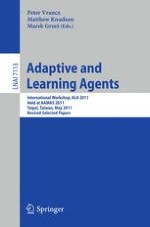This volume constitutes the thoroughly refereed post-conference proceedings of the International Workshop on Adaptive and Learning Agents, ALA 2011, held at the 10th International Conference on Autonomous Agents and Multiagent Systems, AAMAS 2011, in Taipei, Taiwan, in May 2011. The 7 revised full papers presented together with 1 invited talk were carefully reviewed and selected from numerous submissions. The papers are organized in topical sections on single and multi-agent reinforcement learning, supervised multiagent learning, adaptation and learning in dynamic environments, learning trust and reputation, minority games and agent coordination.
